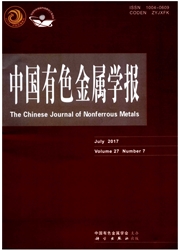

 中文摘要:
中文摘要:
采用热挤压成型工艺制备AA8030(Al-0.7Fe-0.2Cu)铝合金棒材,通过金相(OM)、扫描电镜(SEM)、透射电镜(TEM)及电导率测量等研究挤压比对合金微观组织及电性能的影响。结果表明:合金在挤压变形过程中发生动态再结晶,且分布于铸态合金中的网状Al6Fe相在挤压过程中转变为Al3Fe相,Al3Fe相能够促进再结晶形核、钉扎晶界、细化合金晶粒。在挤压变形过程中,随着挤压比(λ=6~28)的增大,合金电导率先上升再下降;当λ=13时,合金电导率达到最大值60.8%(IACS)。运用Matthiessen公式计算不同固溶原子含量时合金的电导率,模型预测结果与实验结果吻合良好。计算及实验结果表明:在较低的挤压比(λ=6~17)下,AA8030合金的电性能主要依赖于固溶原子含量的变化;而在较高的挤压比(λ=17~28)下,合金的电性能将受到固溶原子、位错密度及Al 3 Fe相形貌的综合影响。
 英文摘要:
英文摘要:
AA8030 aluminum alloy (Al-0.7Fe-0.2Cu) rod was prepared by hot extrusion, and the influences of extrusion ratio on microstructure and electrical properties of alloy were investigated by OM, SEM, TEM and conductivity determination. The results show that the dynamic recrystallization occurs during hot extrusion, moreover, the meshy Al 6 Fe phase is transformed into Al 3 Fe phase after hot extrusion, Al 3 Fe phase promotes recrystallization nucleation, pins grain boundary and refines alloy grain. During hot extrusion, as the extrusion ratio (λ=6-28) increases, the electrical conductivity of alloy increases at first, then decreases, whenλ=13, the electrical conductivity of alloy reaches a maximum value of 60.8%(IACS). Matthiessen equation was used to calculate the effect of solution atom on the electrical performance of alloy, the model predictions are in good agreement with experimental results. The results indicate that when the extrusion ratio is low (λ=6-17), the electrical performance of alloy depends on the content of solution atom, at a higher extrusion ratio (λ=17-28), the electrical performance will be affected by solution atom, dislocation density and morphology of Al 3 Fe phase.
 同期刊论文项目
同期刊论文项目
 同项目期刊论文
同项目期刊论文
 Concurrent formation of two different type precipitation-free zones during the initial stage of homo
Concurrent formation of two different type precipitation-free zones during the initial stage of homo 期刊信息
期刊信息
